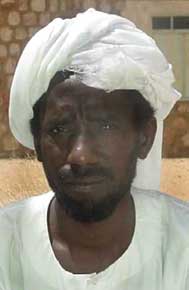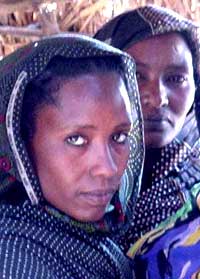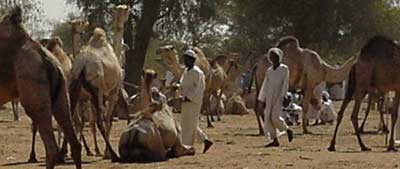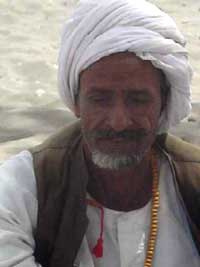

 The
Kababish -a loosely defined name
that describes a group of people who are both Arab and African. These nomadic
people herd their camels across the Sahara Desert in search of food and water.
They are traditionally Muslim but do not strictly follow the rules of Islam due
to their harsh desert lifestyle.
The
Kababish -a loosely defined name
that describes a group of people who are both Arab and African. These nomadic
people herd their camels across the Sahara Desert in search of food and water.
They are traditionally Muslim but do not strictly follow the rules of Islam due
to their harsh desert lifestyle.
Location: The Kababish territory (Northern Kordofan) is located in Northwestern Sudan, the beginning of the Libyan Desert. Like other nomadic African-Arab tribes, the Kababish live in tents with their camel herds, in search of vegetation and water. They have a complex system of migration, in which different parts of the family move to different places during certain times of the year. Some of the Kababish have become semi-nomadic and live in villages most of the time, which are located to the west of Khartoum, the capital city.
History: Most of their ancestors came from Arabia and intermarried with Beja, Moors, and various other North African tribes. They flourished in the Sudan by roaming over the huge expanse of land to herd their large camel herds. Today, the confederation of tribes that form the Kababish is vague. Affiliations are loose, administrative control is hard to enforce because the territory is so broad, and there is no infrastructure in the area. Ever since the drought in the mid-80s, life for the Kababish has been hard. The camel herds have decreased dramatically, and many clans have moved out of the desert and closer to the cities.
 Appearance:
The Kababish have darker complexions than traditional Arabs do, but they are
lighter than the dark black-skinned tribes of the South. Other Sudanese tribes
will say that the Kababish are white-skinned Arabs. Compared to most other
tribes, this is a true description. The Kababish women wear brightly colored
tobes, which are long pieces of material wrapped all around the body a few times
and covering the head. The men wear white gowns, loose pants underneath, and a
white hat or turban on their head. Because life in the desert is very dangerous,
all of the Kababish men wear sheathed daggers on their left arms. Most carry
swords and sometimes even shotguns or rifles.
Appearance:
The Kababish have darker complexions than traditional Arabs do, but they are
lighter than the dark black-skinned tribes of the South. Other Sudanese tribes
will say that the Kababish are white-skinned Arabs. Compared to most other
tribes, this is a true description. The Kababish women wear brightly colored
tobes, which are long pieces of material wrapped all around the body a few times
and covering the head. The men wear white gowns, loose pants underneath, and a
white hat or turban on their head. Because life in the desert is very dangerous,
all of the Kababish men wear sheathed daggers on their left arms. Most carry
swords and sometimes even shotguns or rifles.
Homes: Because the Kababish are a nomadic people, they live in dikkas, or camps. Their homes are tents (xaymi) made with camel hair roofs and cotton sides held up by wood or baked mud structures. Many of the tents are decorated inside with leather art, baskets, gourds, and wool ornaments. The Kababish lifestyle dictates that the tent's decorative ornaments also have a practical use. The basic item of furniture is a double bed made of a wooden frame and bound with strips of leather. Traditionally, Arabs are very hospitable and always provide for their guests. So even if they have very little, they will offer it all to any visitor who happens to be passing by. Hot tea containing a spice near to cinnamon is always offered to guests along with nuts and berries native to the land.
Family: While the Kababish men move across the desert with their camel herds, the women and children stay home in the dikka. The women tend to the gardens, while some women go and stay at the camel markets in order to sell tea and coffee to the traders. Kababish children are sent to herd animals out in the desert sands almost as soon as the can walk. They have been described as calm, contemplative and responsible. Considering the conditions in which they live, these are not surprising characteristics.

Language: Their language is a form of Sudanese Arabic that is distinctive to the desert peoples of Sudan. Unfortunately, most Kababish cannot read or write.
Identity: As nomadic camel herders, they have high social status among the desert tribes. Camels are high in value and are seen as a symbol of wealth.
Religion: The Kababish are Sunni Muslims. However, as a rule, most Kababish are not extremely religious because they are not educated in the proper ways of Islam; therefore, strictness to the religion is not a priority, especially for women. Islam is the tribe’s religion, but the Kababish see it as a tradition rather than a sought after answer to life.

What now?
God longs for these people to bow down before Him, and He promises that every
tribe will be represented in heaven. I know God is moving and working out His
will in the lives of the Kababish. But I also know that today, people of the
Kababish tribe died and will spend eternity in Hell separated from God. So yes,
the gospel message does carry some urgency. Please be an intercessor for these
people who have no one among them to petition for their salvation before the
throne of the Most High... for God hears the cries of His people.
Prayer Specifics...
Ask the Lord of the harvest to send forth laborers into Sudan.
Ask God to raise up prayer teams that will break up the soil through worship and intercession.
Pray that God will send forth Christian teachers to work among the Kababish tribes.
Ask the Holy Spirit to lift the veil from the hearts and minds of the Kababish and to soften their hearts towards
Pray for the future Christian believers of the Kababish that God will raise up.
Pray that God will open the hearts of Sudan's governmental leaders to the Gospel.
Pray that Christian workers are able to get visas into Sudan.
Ask the Lord to raise up strong groups of Christian believers among the Kababish